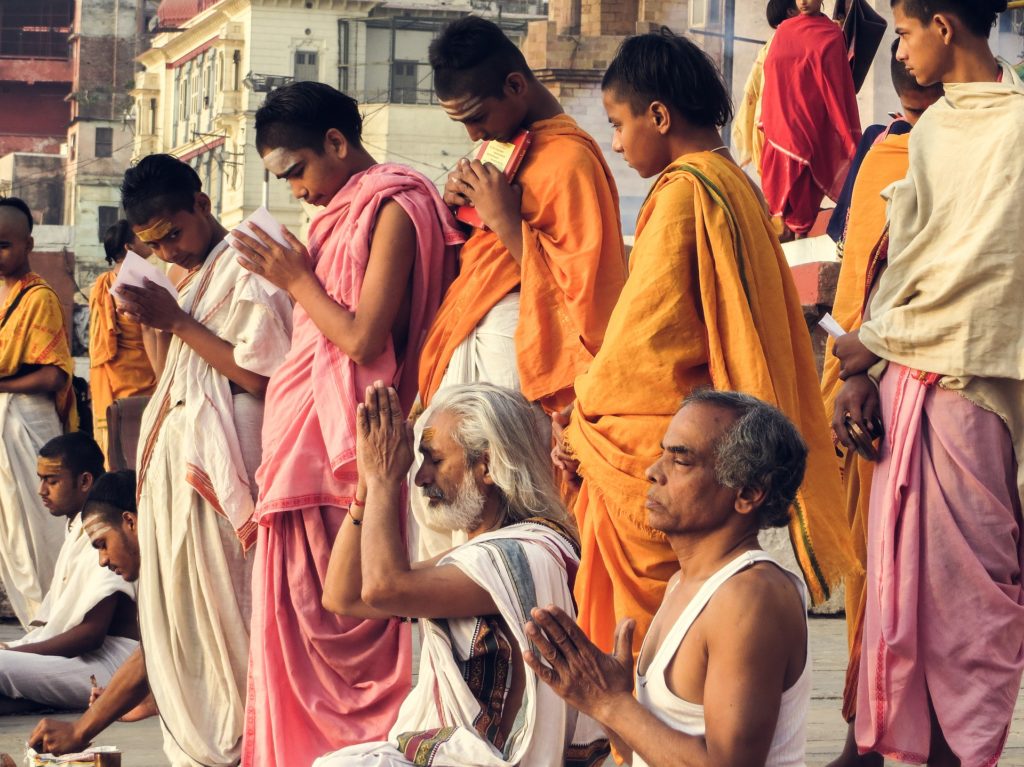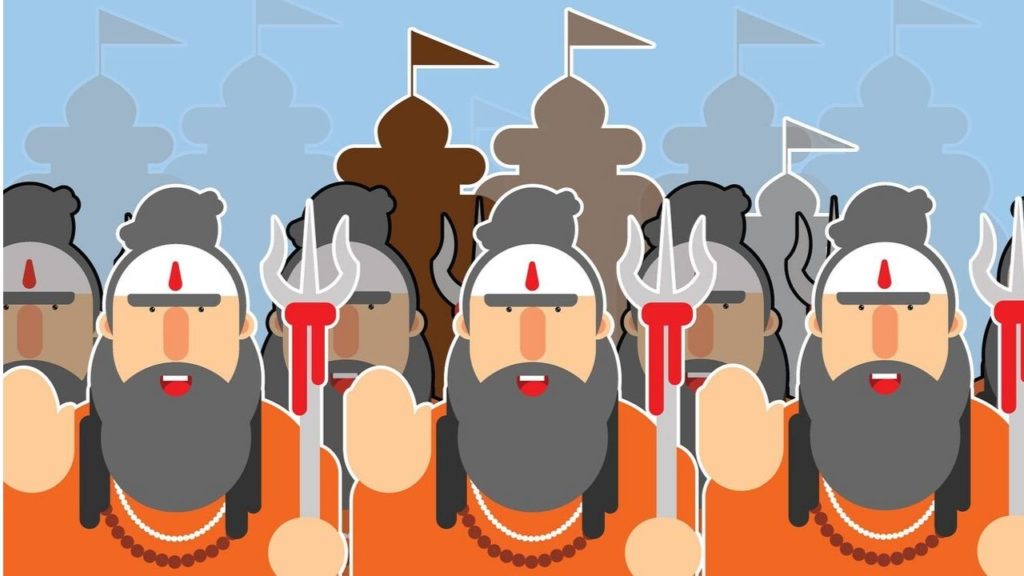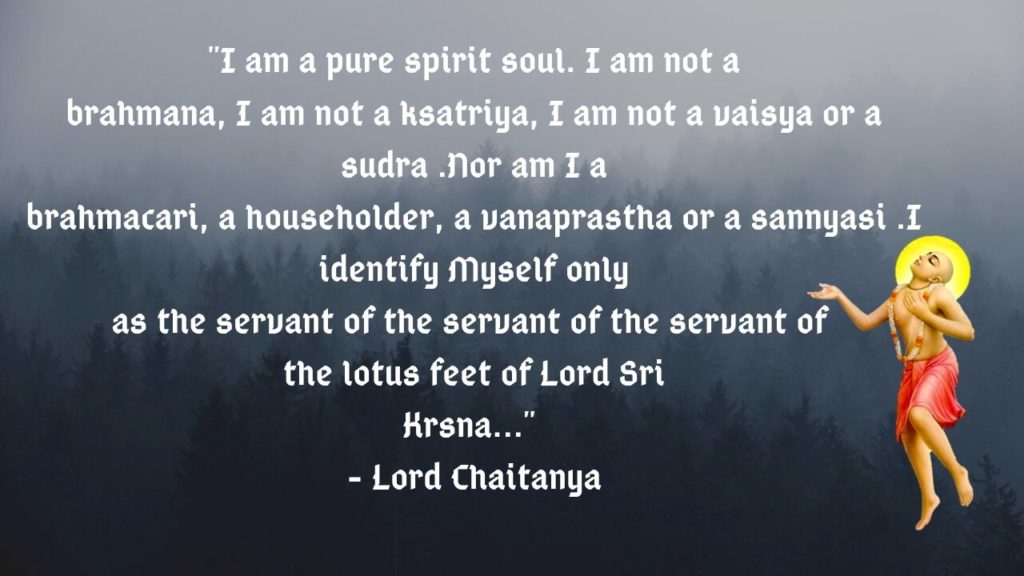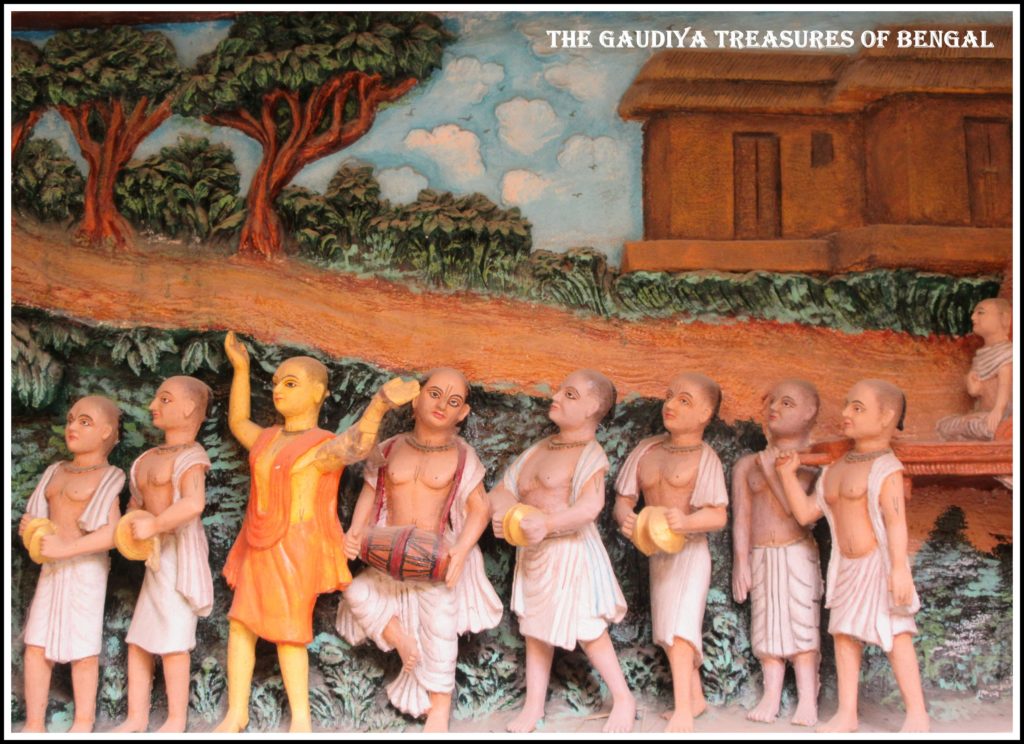#1 The underlying Principle of Varna system (Varnashrama dharma) as explained in Sanatan Dharma

Sanatan Dharma explains that a human being can be classified into four varnas (castes) – brahmana (priests), Kshatriya (Kings/administrators), Vaisya (merchants), and Shudra (workers) depending upon their individual nature and inclinations. Based on their caste (varna), human beings can be assigned some specific occupational duties. Indeed, everyone has a prescribed duty according to the Varnashrama dharma. Those who execute their prescribed duties live peacefully and are not greatly disturbed by material conditions. The spiritual orders of brahmacharya (celibate), grihastha (householder), vanaprastha (retired), and sannyasa (renounced) are called ashramas. If one executes his prescribed duty in both the social and spiritual order, the Supreme Lord becomes satisfied. However, it must be understood that the ultimate objective of this varna system (varna and ashrama) is to gradually purify one’s consciousness so that one grows eligible to serve and please Vishnu, the Supreme Lord. This is also confirmed in Vishnu Purana –
varnasramachara-vata
purusena parah puman
vishnur aradhyate pantha
nanyat tat-tosa-karanam
(Vishnu Purana 3.8.9)
–
Lord Vishnu, the Supreme Lord, is worshiped by the proper execution of prescribed duties in the system of varṇa and ashrama. There is no other way to please the Supreme Personality of Godhead. One must be established in the institution of the four varnas and ashramas.
All the actions that one executes in one’s life must be done to please the Supreme Lord. The ultimate purpose to serve and satisfy the Supreme is the underlying principle emphasized in Sanatan Dharma. This is also confirmed in Bhagavad Gita as follows –
yat karosi yad asnasi
yaj juhosi dadasi yat
yat tapasyasi kaunteya
tat kurusva mad-arpanam
(Bhagavad Gita 9.27)
–
O son of Kunti (Arjuna), all that you do, all that you eat, all that you offer and give away, as well as all austerities that you may perform, should be done as an offering unto Me (Krishna).
However, if one blindly follows the varna system without realizing its spirit or without developing a service attitude towards the Supreme, then it becomes simply useless and unnecessary labor. This is confirmed in Srimad Bhagavatam as follows –
dharmah svanusthitah pumsam
visvaksena kathasu yah
notpadayed yadi ratim
srama eva hi kevalam
(Srimad Bhagavatam 1.2.8)
–
If one executes the occupational duties of Varnashrama dharma (varna system) but does not develop devotion unto the Supreme Lord, then his activities are useless. His occupation simply becomes unnecessary labor.
#2 Is there any particular Varna or Ashrama that can serve the Supreme Lord ?
According to the Vedic scriptures that constitute the teachings of Sanatan Dharma, any living entity can embrace the path of devotion and attain the Supreme spiritual destination. Bhagavad Gita establishes this point as follows –
Mam hi partha vyapasritya
Ye pi syuh papa-yonayah
Striyo vaisyas tatha sudras
Te pi yanti param gatim
(Bhagavad Gita 9.32)
–
O son of Partha, those who take shelter in Me, though they may be women, Vaisyas, Shudras or belonging to sinful families – can achieve the Supreme destination.
#3 Are Brahmanas (priestly class) and sannyasis (renounced) the superior of all the other varnas and ashramas ?
If we scrutinize Sanatan Dharma, we would realize that the only criterion by which one is considered superior to the other is by his eagerness and commitment to serving the Supreme Lord. This is confirmed in Skanda purana, Kasi Khanda as follows –
Brahmanah Kshatriyo vaisyah
Sudro va yadi vetarah
Vishnu bhakti samayukto
Jneyah sarvottamas ca sah
(Skanda purana, Kasi Khanda, 21.63)
–
Whether one is a brahmana, Kshatriya, vaisya, shudra or an outcaste – if he has taken shelter of Vishnu bhakti (devotion unto Lord Vishnu), he is considered superior to all.

Elsewhere, we find in Naradiya Purana :
Svapaco pi mahipala
Vishnu bhakto dvijadhikah
Vishnu bhakti vihino yo
Yatis ca svapacadhikah
–
O King, if a Chandala (barbarian), dog eater embraces the path of pure devotion unto the Supreme Lord Sri Vishnu, he is superior to a brahmana. On the other hand, if a sannyasi is not a devotee of Sri Vishnu, then he is more degraded than a Chandala (barbarian).
#4 Does birth determine one’s varna ?
Sanatan Dharma scriptures recommend that a person’s varna or caste is ascertained by his guna (nature) and karma (activities) and not solely by the assessment of his janma (birth) although this has recently become an exclusive practice. This question has been addressed by Maharaja Yudhisthira in the Vana Parva of Mahabharata.
The snake asked, ‘O Maharaja Yudhisthira, who is a brahmana and what is the object of knowledge? You are very intelligent, therefore I will be enlightened by your answer’. Maharaja Yudhisthira replied, ‘A person who possesses truthfulness, charity, forgiveness, sobriety, gentleness, austerity, and lack of hatred – Such a person is a brahmana’. The snake then enquired – ‘But, even Shudras possess these qualities. Many of them possess truthfulness, charity, freedom from anger, nonviolence, non-enviousness, and lack of hatred’. Maharaja Yudhisthira then clarified, ’If such symptoms are found in a shudra then he should never be considered a Shudra, just as a brahmana is not a brahmana if he does not possess these qualities. O snake! Only a person who is endowed with the characteristics of a brahmana can be regarded as a brahmana, otherwise, he is simply a Shudra’.

Elsewhere the Brahma Sutras reveal –
tad abhava nirdharane ca pravrtteh
–
Whether a person belongs to a varna other than that of his birth may be ascertained by considering his qualities.
The Shanti Parva of Mahabharata narrates a related pastime in which Bharadwaja muni had a similar doubt and he clarified the same with Bhrigu Maharaja. He asked that since there were innumerable categories of animate and inanimate living entities – how can one possibly determine their castes?
Bhrigu Maharaja replied that there was not much difference between the various castes. When Lord Brahma initially created this universe, all the living entities were endowed with godly qualities and they were all brahmanas. Later on, as people became degraded, they attained the designations of different varnas (castes). He went on to explain that when the brahmanas commit violence, speak lies, become greedy, earn their livelihood by any and all means, lose their purity by committing sinful activities, then they become degraded into shudras. Hence, it is the qualities, and not one’s birth and lineage, that determine whether a person is a brahmana. One who realizes the self is always satisfied, devoid of faults like lust and anger, possesses qualities like peacefulness, self-control, and is devoid of envy, thirst for material enjoyment, illusion and is untouched by pride, false ego, etc. Such a person is a brahmana.
Innumerable incidents illustrating this fact are known to those who are well aware of Indian history. For example, Gadhi was the son of Kusika and belonged to the Chandra (moon) dynasty. He was the king of Kanyakubja. His son, Visvamitra, elevated himself to become a brahmana, a great Brahma rishi, by the strength of his austerities. Even the great king Bali Maharaja, bore sons, some of who became brahmanas and some of who became Kshatriyas. His brahmana sons came to be known as Baleya brahmanas, whereas his Kshatriya sons came to be known as Baleya Kshatriyas.
#5 Adhering to Varna system (Varnashrama) is unnecessary for devotees of the Supreme Lord
Lord Krishna instructs the following to His devotees in Bhagavad Gita –
Sarva dharman parityaja
Mam ekam saranam vraja
Aham tvam sarva papebhyo
Moksayisyami ma sucah
(Bhagavad Gita, 18.66)
–
Abandon all varieties of religion and just surrender unto Me. I shall save you from all sinful reactions. Do not fear.
Here Lord Krishna confirms that an advanced devotee, who understands the essence that engaging in devotional service of the Supreme Lord is the ultimate goal of life, does not have to bother about strictly adhering to the formalities of the Varnashrama dharma. He should accept whatever is favorable for devotional service and simply surrender unto the Supreme Lord. This surrender will save him from all kinds of sinful reactions as the Lord personally vows to protect him. But for those who have not yet realized this essence of Sanatan Dharma and have not yet savored the joy of devotion, should adhere to the rules and regulations of the varna system as delineated in the Karma Kanda of the Vedic literatures. Srimad Bhagavatam declares –
ajnayaivam gunan dosan
mayadistan api svakan
dharman samtyajya yah sarvan
mam bhajet sa ca sattamah
(Srimad Bhagavatam, 11.11.32)
–
Occupational duties are defined in the religious scriptures. He perfectly understands that the ordinary religious duties prescribed by Me in various Vedic scriptures possess favorable qualities that sanctify the performer, and that their neglect constitutes a discrepancy in one’s life. Having taken complete shelter at My lotus feet, however, such a saintly person ultimately renounces such ordinary religious obligations and worships Me alone. Such a person is considered a first-class man.

Narada Muni confirms the below in Srimad Bhagavatam –
yada yasyanugrhnati
bhagavan atma-bhavitah
sa jahati matim loke
vede ca parinisthitam
(Srimad Bhagavatam 4.29.46)
–
When one actually takes to the loving service of the Supreme Personality of Godhead, he gives up all duties in the material world, as well as all the ritualistic activities prescribed in the Vedas. In this way, one is established in the service of the Lord.
#6 Elevating consciousness and transcending varna system through devotion
One can very easily transcend the varna system and achieve its essence by following the path of devotion as instructed in Sanatan Dharma. Srimad Bhagavatam teaches us –
Yan nama sakrc chravandt
Pukkaso pi vimucyate samsarat
–
Merely by listening to Harinama (holy name of Lord Hari) just once, even chandalas (barbarians), men of the lowest class, are freed from all material contamination.
Elsewhere, Srimad Bhagavatam proclaims –
Aho bata svapaco to gariyan
Yaj jihvagre vartate nama tubhyam
Tepus tapas te juhuvuh sasnur arya
Brahmanucur nama grnanti ye te
(Srimad Bhagavatam 3.33.7)
–
Oh, how glorious are they whose tongues are engaged in chanting harinama! Even if born in the families of dog eaters, such persons are worshipable. Those who chant harinama (holy name of Lord Hari) must have executed all kinds of austerities, fire sacrifices and achieved all the good manners of the Aryans. To be chanting harinama they must have bathed at the holy places of pilgrimage, studied the Vedas, and fulfilled everything required.Proktena bhakti yogena
Bhajato masakrn muneh
Kama hridaya nasyanti
Sarve mayi hrdi sthite
(Srimad Bhagavatam 11.20.29)
–
When an intelligent person engages constantly in worshiping Me (Krishna) through loving devotion as explained by Me, his heart quickly becomes firmly situated in Me. Thus, all material desires within the heart are vanquished.

Such a devotee attains lasting peace and can attain the ultimate aim of Varna system by cleansing and elevating his consciousness. Such a devotee is assured of the personal protection of the Lord. Sri Krishna declares in Bhagavad Gita –
Ksipram bhavati dharmatma
Sasvac chantim nigacchati
Kaunteya pratijanthi
Na me bhaktah pranasyati
(Bhagavad Gita – 9.31)
–
He quickly becomes righteous and achieves lasting peace. O son of Kunti (Arjuna), declare it boldly that My devotee never perishes.
Such a devotee becomes transcendentally situated, and realizing the Supreme Lord becomes joyful at heart. The fortune of such a person has been described in Bhagavad Gita –
brahma-bhutah prasannatma
na socati na kanksati
samah sarvesu bhutesu
mad-bhaktim labhate param
(Bhagavad Gita 18.54)
–
One who is thus transcendentally situated at once realizes the Supreme Brahman. He never laments nor aspires to have anything; he is equally disposed towards every living entity. In such a state he attains pure devotion unto Me.
Such a devotee transcends the Varna system in its actual sense and having understood the essence of life, he treats all the other living entities as his equals. This is confirmed in Bhagavad Gita –
vidya-vinaya-sampanne
brahmane gavi hastini
suni caiva sva-pake ca
panditah sama-darsinah
(Bhagavad Gita, 5.18)
–
The humble sage, possessing true knowledge, sees with equal vision a learned and gentle brahmana, a cow, an elephant, a dog, and a dog-eater (outcaste).